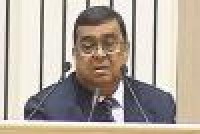Former CJI's rejoinder to newspapers
"I certainly object to canards masquerading as news, being published in the newspapers to deliberately malign an individual."
THE HOOT desk. Pix: Justice Kabir

In what may be a first, a retired Chief Justice has issued a press release countering reports in two major newspapers. He has also clarified his stand in a Sahara-SEBI matter where he went against another Supreme Court Bench in giving the Sahara group some breathing space; by giving it more time to pay Rs.24,000 crore fine to its investors.
The good judge refers to the reports as canards masquerading as news, and wonders about the timing of the two stories, one in the Indian Express on the 12th of July, another in the Times of India, on the 19th of July. The story as reported by the Live Law News Network is reproduced below.
Though Justice Kabir said he hoped both newspapers would carry his press release in full, they did not, seeing that he also released a letter to the Gujarat High Court Chief Justice Bhaskar Bhattacharya, whose allegation had been the subject of the Express story. Both newspapers found the retired CJI’s direct reply to the Justice Bhattacharya more newsworthy, and tagged on his complaints about the newspaper reports below that story. Besides, the conventional thing for the judge to do would have been to send a rejoinder separately to each newspaper, about the story that paper did.
Justice Altamas Kabir issues Press Release against TOI and Indian Express reports; clarifies stand in Sahara-SEBI matter
On 23/07/2013 by Live Law Network
The former Chief Justice of India, Altamas Kabir has issued a press release to refute the allegations leveled against him by Times of India and Indian Express. He wrote that there is a difference between responsible reporting of facts and fabricated reports that are published in newspapers to deliberately malign an individual. He asserted that it had become essential for him to put the records straight.
The Indian Express on 12th July, 2013 had reported that Chief Justice Altamas Kabir blocked Gujarat Chief Justice Bhaskar Bhattacharya’s elevation to the Supreme Court because as a member of the collegium of the Calcutta High Court, Justice Bhattacharya had opposed the appointment of CJI Kabir’s lawyer sister to the Bench.
Justice Kabir in his press release referred to it as sensational journalism and accused Indian Express of running the report in complete ignorance of how the collegium system functions. The collegium, he said comprises of five of the most senior most judges who take a collective decision on the issue of elevation of a judge to Supreme Court. This decision is taken unanimously and if two judges dissent then the name is not recommended. He added that apart from profound knowledge in the field of law, there are various other factors which are taken into consideration before nominating a person for appointment as judge to the Supreme Court. He emphasized that the decision of the collegium in the case of Gujarat Chief Justice was unanimous and that there was no individual bias that had prevented the Gujarat Chief Justice from being given a berth in Supreme Court.
The Times of India on 19th July, 2013 had reported that Chief Justice of India (CJI) Altamas Kabir, a fortnight prior to his retirement proposed before the collegium of four senior-most Supreme Court judges for recommending to the Centre to appoint a high court Chief Justice as judge of the Apex Court.
With regard to this, Justice Kabir has stated that his attempt was to ensure that Madhya Pradesh was represented in the Supreme Court as there was no Supreme Court judge from that State since August, 2012. He also made it clear that the process to have a High Court judge from Madhya Pradesh elevated to Supreme Court had begun “soon after he assumed office….but got deferred on one pretext or the other”. Justice Kabir also wrote that the meeting of 2nd July, 2013 did not emanate from him but by the other members of the Collegium including the present Chief Justice of India. However, on 2nd July 2013, when the collegium met, he was informed by the members that since the present the Chief Justice of India has been nominated to become the Chief Justice, no further meetings of the collegium could be held and that the opinion of five previous Chief Justices had been taken in this regard.
Thirdly, Justice Kabir also received flak from media for going against another Supreme Court Bench in giving Sahara group some breathing space; by giving it more time to pay Rs.24,000 crore fine to its investors.
Justice Kabir Wrote that “we felt that it to be in the interest of the depositors, to extend the time for depositing the installments by a short period, as that would give them a chance to recover their dues quickly instead of having to wait till SEBI attached and sold the properties of Sahara which could turn out to be a long drawn affair. The decision to extend the time for depositing the installments was the joint decision of the Bench upon consultation.”
He concluded his press statement by saying that “The attempts of some people, including some of the advocates who claimed to have appeared in the matter, to assign an ill-motive in granting such extension, again discloses the mind-set of journalists who base their articles on innuendos in order to make out a ‘story’ to bolster their reputation as investigative journalists.”
Press release courtesy Bar & Bench
Subscribe To The Newsletter






